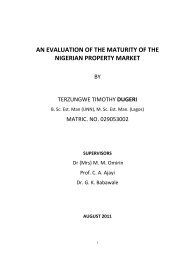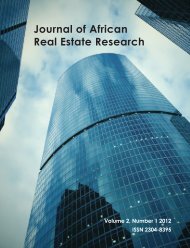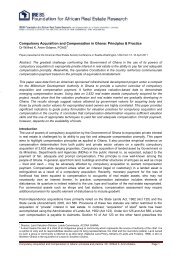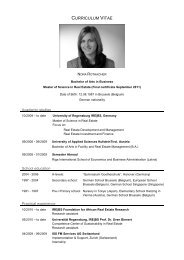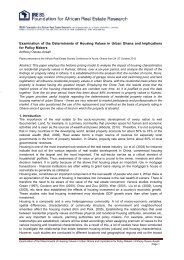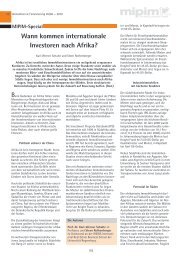You also want an ePaper? Increase the reach of your titles
YUMPU automatically turns print PDFs into web optimized ePapers that Google loves.
General Application in force in England as at 1 January 1900 forman integral part of the Nigerian Legal system. Other sources ofthe Nigerian law include local legislation (State and Federal),Nigerian case law as well as customary law. Disputes betweencorporate bodies are usually resolved by the civil courts. Theprinciples of judicial precedent and hierarchy of courts are also afundamental part of the Nigerian legal system with the SupremeCourt of Nigeria at the apex of the court system. Other courts inhierarchical order are the Court of Appeal, the Federal HighCourt, State High Court, National Industrial Court, Sharia Courtof Appeal and Customary Court of Appeal, Magistrate Court,District Court, Area Court and Customary Court.Intellectual PropertyThe Nigerian legal system strives to protect intellectual propertyas applicable in other parts of the world. The Trade Marks Actand Patent and Designs Act are key statutes to protectIntellectual Property.Financial ServicesThe adoption of Universal Banking in Nigeria has engenderedthe emergence and existence of financial conglomerates whichinvolve different regulatory authorities such as the Central Bankof Nigeria (CBN), Security and Exchange Commission, NationalInsurance Commission and the Corporate Affairs Commission.Apart from the conventional banking functions like receivingdeposits on current, savings or other accounts, paying orcollecting cheques drawn by or paid in by customer, provision offinance or credit facilities, Nigerian banks can under theUniversal Banking program undertake one or a combination of(a) clearing house activities (b) capital market activities (such asunderwriting / issuing house activities) or (c) insurance services(such as marketing, underwriting and reinsurance services).InsuranceThe insurance industry in Nigeria is governed by the InsuranceAct with the National Insurance Commission (NAICOM) as itsregulatory body. The Insurance Act complies significantly withthe International Association of Insurance Supervisors (IAIS)core principles and vested better regulatory powers withNAICOM.Strategic Growth Initiatives by Government/Private SectorThe Federal Government of Nigeria is committed to improvingthe economy and to rank it among the 20 largest economies inthe world. To achieve this purpose the Federal Government setup an economic team known as the Nigeria Vision 20:2020Economic Transformation Blueprint (Vision 20:2020). Thegovernment also embarked on a Public Private Participation(PPP) scheme, as well as partnering with State Governments inexecuting several projects aimed at strengthening the economy.Membership of International and Regional OrganisationsNigeria is a member of the <strong>Africa</strong>n Union (AU), United Nations(UN), Organisation of Petroleum Exporting Countries (OPEC),British Commonwealth, Economic Community of West <strong>Africa</strong>nStates (ECOWAS), the New Partnership for <strong>Africa</strong>’s Development(NEPAD), World Bank, International Monetary Fund (IMF), WorldTrade Organisation (WTO) and International LabourOrganisation (ILO).Key Industry SectorsOil and gas, coal, tin, columbite, agriculture, textiles, cement andother construction materials, beverages, footwear, chemicals,printing, ceramics, steel, small commercial ship constructionand repair, tourism, telecommunications and banking.Information and Communication TechnologyNigeria is one of the largest and fastest growingtelecommunications markets in the world and is one of the mostattractive investment arenas in the world. The resultinginvestment landscape has created additional opportunities fornew investors in the industry.Nigeria has successfully launched two telecommunicationssatellites, namely NigComSat-1 and NigComSat-2.MiningThe Nigerian government policy focus on the mining sector isbased on the need to develop a private sector led miningindustry with Government restricting its role to that of aregulator. Nigeria is blessed with 34 minerals but thegovernment has prioritised the development of this industry toonly 7 minerals: coal, bitumen, limestone, iron ore, barytes, goldand lead-zinc. This reflects their strategic importance to thecountry’s economy and their availability in quantities to sustainmining operations for years.AgricultureThe discovery of crude oil in the late 1960s / early 1970s led tothe abandonment of food exports. The country now depends onfood imports. However the present government has renewed itseffort to rejuvenate the agricultural sector. The Government hascreated several incentives to encourage private investment inthis sector.Trade and InvestmentThe Nigerian economy is dominated by crude oil exports whichaccount for about 90% of its foreign exchange earnings and 65%of budgetary revenues. Other exports are cocoa, palm oil,groundnuts, cotton, timber and rubber. Major importcommodities in Nigeria include machinery, chemicals, transport,equipment, manufactured goods and live animals.In a bid to diversify the country’s economic base, thegovernment has introduced a regulatory framework for theexploration and exploitation of mineral resources by theenactment of the Mining and Minerals Act. Opportunities nowexist for the exploitation and export of natural gas, bitumen,limestone, coal, tin, columbite, gold, silver, lead-zinc, gypsum,glass sands, clays, asbestos, graphite, and iron ore, amongothers. The Nigerian Investment Promotion Commission (NIPC)is a Federal Government Agency statutorily charged with theresponsibility of promoting, co-ordinating and monitoring allforeign investments in Nigeria. In order to shorten the servicedelivery time and to reduce the cost of entry into business inNigeria, the NIPC provides support services as a one-stopinvestment centre for all foreign investors.Labour RelationsWith a labour force of about 48 million people, there isavailability of skilled and unskilled labour in Nigeria at a relativelycheap rate compared with other parts of the world. The countryhas several labour laws that govern the relationship betweenemployers and employee such as the Factory Act, Workmen’sCompensation Act, Labour Act and Trade Dispute Act.Presently all labour matters and labourdisputes have been removed from thegeneral courts and vested in the NationalIndustrial Court (a specialised courtestablished to exclusively and expeditiouslyhandle all labour disputes in the country).63




